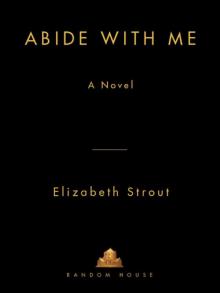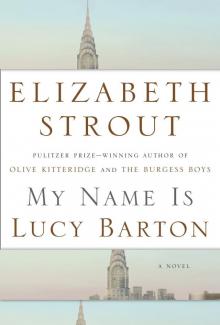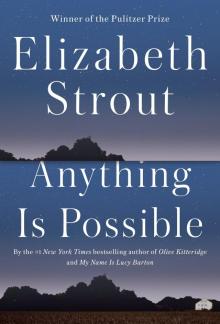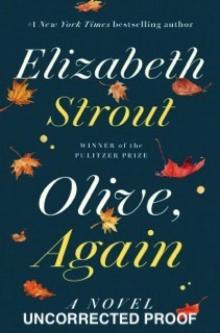- Home
- Elizabeth Strout
Anything Is Possible Page 3
Anything Is Possible Read online
Page 3
“Oh.” Tommy looked through the windshield at the house sitting so silently and so worn out there in the sunshine, its blinds drawn like tired eyelids. “Well, here’s an example on a large scale.” And then Tommy told Pete about what his brother had seen in the war, the women who had walked through the camps, how some had wept and others had looked furious and would not be made to feel bad. “And so there’s a struggle, or a contest, I guess you could say, all the time, it seems to me. And remorse, well, to be able to show remorse—to be able to be sorry about what we’ve done that’s hurt other people—that keeps us human.” Tommy put his hand on the steering wheel. “That’s what I think,” he said.
“My father showed remorse. He’s what you’re talking about, in one person. The contest.”
“I suppose you’re right.”
The sun had grown so high in the sky it could not be seen from the car.
“I never have talks like this,” said Pete, and Tommy was struck once again by how young this boy-man seemed. Tommy experienced a tiny physical pain deep in his chest that seemed directly connected to Pete.
“I’m an old man,” said Tommy. “I think if we’re going to have talks like this one I should stop by more often. How about I see you two Saturdays from now?”
Tommy was surprised to see Pete’s hands become fists that he banged down on his knees. “No,” Pete said. “No. You don’t have to. No.”
“I want to,” said Tommy, and he thought—then he knew—as he said this that it was not true. But did that matter? It didn’t matter.
“I don’t need someone coming to see me out of obligation.” Pete said this quietly.
The pain deep in Tommy’s chest increased. “I don’t blame you for that,” he said. They sat together in the car, which was now warm, and the smell, to Tommy, was palpable.
In a moment Pete spoke again, “Well, I guess I thought you were coming here to torture me, and I was wrong about that. So I guess maybe I’d be wrong to think you were just obliging me.”
“I think you’d be wrong,” said Tommy. But he was aware, again, that this was not true. The truth was that he did not really want to visit this poor boy-man seated next to him ever again.
They sat in silence for a few moments more; then Pete turned to Tommy, gave him a nod. “All right, I’ll see you then,” said Pete, getting out of the car. “Thanks, Tommy,” he said, and Tommy said, “Thank you.”
Driving home, Tommy was aware of a sensation like that of a tire becoming flat, as though he had been filled—all his life—with some sustaining air, and it was gone now; he felt, increasingly as he drove, a sense of fear. He could not understand it. But he had told what he had vowed to himself never to tell—that God had come to him the night of the fire. Why had he told? Because he wanted to give something to that poor boy who had been smashing the sign of his mother so ferociously. Why did it matter that he had told the boy? Tommy wasn’t sure. But Tommy felt he had pulled the plug on himself, that by telling the thing he would never tell he had diminished himself past forgiveness. It really frightened him. So you believe that?, Pete Barton had said.
He felt no longer himself.
He said, quietly, “God, what have I done?” And he meant that he was really asking God. And then he said, “Where are you, God?” But the car remained the same, warm, still slightly smelling from the presence of Pete Barton, just rumbling over the road.
He drove more quickly than he usually did. Going past him were the fields of soybeans and corn and the brown fields as well, and he saw them only barely.
At home, Shirley was sitting on the front steps; her glasses twinkled in the sunlight, and she waved to him as he drove up the small driveway. “Shirley,” he called as he got out of the car. “Shirley.” She pulled herself up from the steps by holding on to the railing, and came to him with worry on her face. “Shirley,” he said, “I have to tell you about something.”
At the small kitchen table, in their small kitchen, they sat. A tall water glass held peony buds, and Shirley pushed it to the side. Tommy told her then what had just happened that morning at the Barton home, and she kept shaking her head, pushing her glasses up her nose with the back of her hand. “Oh, Tommy,” she said. “Oh, that poor boy.”
“But here’s the thing, Shirley. It’s more than that. There’s something else I need to tell you.”
And so Tommy looked at his wife—her blue eyes behind her glasses, a faded blue these days, but with the tiny shiny parts from her cataract surgery—and he told her then, with the same detail he had told Pete Barton, how he had felt God come to him the night of the fire. “But now I think I must have imagined it,” Tommy said. “It couldn’t have happened, I made it up.” He opened both his hands upward, shook his head.
His wife watched him for a moment; he saw her watching him, saw her eyes get a little bit bigger then begin to break into a tenderness around their corners. She leaned forward, took his hand, and said, “But, Tommy. Why couldn’t it have happened? Why couldn’t it have been just what you thought it was that night?”
And then Tommy understood: that what he had kept from her their whole lives was, in fact, easily acceptable to her, and what he would keep from her now—his doubt (his sudden belief that God had never come to him)—was a new secret replacing the first. He took his hand from hers. “You might be right,” he said. A paltry thing he added, but it was true: He said, “I love you, Shirley.” And then he looked at the ceiling; he could not look at her for a moment or two.
Windmills
A few years ago, with morning sunlight coming into her bedroom, Patty Nicely had had the television on, and the sunlight had caused whatever was on the screen to be unseen from certain angles. Patty’s husband, Sebastian, was still alive then, and she was getting herself ready for work. Earlier, she had been making sure that he was set for the day; his illness had only begun back then and she was not sure—they were not sure—what the final outcome would be. On the television was the usual morning show, and Patty watched intermittently as she moved about the bedroom. She was sticking a pearl earring into her earlobe when she heard the woman announcer saying, “Lucy Barton will be with us after the break.”
Patty walked toward the television and squinted, and in a few minutes Lucy Barton—who had written a novel—came on and Patty said, “Oh my gosh.” She went to the bedroom door and called, “Sibby?” Sebastian came into the bedroom then, and Patty said, “Oh, honey, oh, Sibby.” She helped him into bed, and smoothed his forehead. The reason she remembered this now—the fact that Lucy Barton had been on television—was because she had then told Sebastian about the woman. Lucy Barton had grown up terribly poor, right nearby in Amgash, Illinois. “I didn’t know them, since I was in school in Hanston, but they were the kids that people would say, Oh, cooties!, and run away from,” she explained to her husband. Here was why Patty knew this: Lucy’s mother had made dresses, and Patty’s mother had used her as a seamstress. A few times, Patty’s mother had taken Patty and her sisters to Lucy Barton’s home. The place the Bartons lived in was tiny, and it smelled! But here was Lucy Barton: Why, she had become a writer and was living in New York City. Patty said, “Look, honey, she looks nice.”
Sebastian had become interested; she saw his keenness as he listened to this story. In a few minutes he asked some questions, for example, had Lucy seemed different from her brother and sister? Patty said she didn’t know; she hadn’t known any of them, really. But—here was something odd: Lucy’s parents had been asked to the wedding of Patty’s oldest sister, Linda, and Patty had never figured that out, she couldn’t imagine Lucy’s father had even owned a suit, why would they have been at her sister’s wedding? Sebastian said, Maybe your mother didn’t have anyone else who would talk to her at that point, and Patty realized he was exactly right. Patty’s face had turned bright red as she saw the truth to this. Sweetheart, said Sebastian, and reached for her hand.
A few months later Sebastian was gone. Having met in their late thirties, they’
d had only eight years together. No children. Patty had never known a better man.
Today she drove with her car’s air conditioner turned on high; her extra weight made Patty get hot easily, and it was already late May and the weather was lovely—everyone kept saying that the weather was lovely—but for Patty that meant it was really too warm. She drove by a field where the corn was just inches high, and by a field of soybeans bright green and close to the ground. Then she drove through the town, winding her way around the street where some of the houses had explosions of peonies by their porches—Patty loved peonies—and then to the school where she was a high school guidance counselor. She parked, checked her lipstick in the rearview mirror, gave her hair a bounce with her hand, then heaved herself from the car. Across the parking lot was Angelina Mumford getting out of her own car; she was a middle school Social Studies teacher, and her husband had recently left her. Patty gave a big wave, and Angelina waved back.
In Patty’s office were many folders, and also a cluster of small-framed photographs of her nieces and nephews, and there were pamphlets from colleges, all in an array on top of her filing cabinet and on her desk. And there was her scheduling book on her desk too. Lila Lane had missed her appointment from the day before. There was a knock on the door—which was open—and a tall, pretty girl stood there. “Come in,” Patty said. “Lila?”
Unease came into the room with the girl. She slouched in her chair, and the glance she gave Patty made Patty frightened. The girl’s hair was long and blond, and as she reached to pull it up and across one shoulder, Patty saw the tattoos—like a small barbed wire fence—that went across the girl’s wrist. Patty said, “That’s a nice name, Lila Lane.” The girl said, “I was supposed to be named for my aunt, but at the last minute my mom said, Fuck her.”
Patty took the papers and bounced their edges against her desk.
The girl sat up straight, and spoke with suddenness. “She’s a bitch. She thinks she’s better than any of us. I never even met her.”
“You never met your aunt?”
“Nope. She came back here when her father died, my mother’s father, and then she went away and I’ve never met her. She lives in New York and she thinks her shit doesn’t stink.”
“Well, let’s look at your scores here. These are pretty good scores.” Patty never liked her students to speak roughly; she found it disrespectful. She looked over at the girl, then back at the papers. “Your grades are good, too,” Patty added.
“I skipped third grade.” The girl said this with a tone of belligerence, but Patty thought she heard the pride beneath it.
Patty said, “Good for you. Well, then, I guess you were always a good student. They don’t let you skip a grade for nothing.” She raised her eyebrows pleasantly at the girl, but Lila was looking around Patty’s office, studying the pamphlets, the photos of Patty’s nieces and nephews, and then finally she looked for a long moment at the poster on the wall that had a kitten swinging from a branch with the block letters HANG IN THERE below the kitten.
Lila looked back at Patty. “What?” she said.
“I said, they don’t let you skip a grade for nothing,” Patty repeated.
“Of course they don’t. Jeeze-lew-eeze.” The girl moved her long legs so that they went in the other direction, but she stayed slouching.
“Okay.” Patty nodded. “So what about your future? You have good grades, good scores—”
“Are these your kids?” The girl was squinting, and she pointed laconically at the photos.
“Those are my nieces and nephews,” Patty said.
“I know you don’t have kids,” the girl said with a smirk. “How come you don’t have kids?”
Patty felt the faintest blush come to her face. “It just never happened. Now let’s talk about your future.”
“ ’Cause you never did it with your husband?” The girl laughed; her teeth were bad. “That’s what people say, you know. Fatty Patty never did it with her husband, Igor, never did it with anyone. People say you’re a virgin.”
Patty put the papers flat down on the desk. She could feel her face become flaming hot. For a moment her vision blurred; she heard the ticking of the clock on the wall. In her wildest dreams she could not have anticipated what was going to come out of her mouth. She looked hard at the girl and heard herself say the words “Get out of here right now, you piece of filth.”
The girl seemed stunned for just a moment, but then she said, “Hey, wow. They’re right. Oh my God!” And covering her mouth she made a sound of laughter that grew in length and depth so that Patty had a sense of it spilling from her mouth like bile from some creature in a horror film. “Sorry,” the girl said in a moment. “Sorry.”
From nowhere Patty suddenly knew who the girl was. “Your aunt is Lucy Barton,” Patty said. She added, “You look like her.”
The girl stood up and left the room.
—
Patty closed the door to her office and telephoned her sister Linda, who lived outside of Chicago. Perspiration made Patty’s face moist, and she felt her underarms sticky with it.
Her sister answered, saying, “Linda Peterson-Cornell.”
“It’s me,” Patty said.
“I figured. The phone said your school’s name.”
“Well, then how come— Listen, Linda.” And she told her sister what had just happened. Patty spoke in a rush, leaving out what she had said to the girl. “Can you believe it?” she finished. She heard her sister sigh. After a moment, Linda said she never understood how Patty could work with adolescents anyway. Patty told her she was missing the point.
Linda said, “No, I’m not missing the point. The point is Lila Lane, Lucy Barton, Lila this, Lucy that. But who cares about them?” When there was a pause, Linda continued, “Seriously, Patty. The fact that Lucy Barton’s niece is such trash should come as no surprise, I mean really.”
“Why do you say that?”
“Because. Don’t you remember them? They were just trash, Patty. Oh my God, I just remembered they had those—what? Cousins, I think? The boy’s name was Abel. Oh my God, he was something. He’d stand in the dumpster behind Chatwin’s Cake Shoppe and go through the garbage, looking for stuff to eat. Was he that hungry? Why would he do that? But I remember he’d do it with no embarrassment at all. I remember Lucy being with him. It made me shudder. It still does, honestly. His sister’s name was Dottie. A scrawny girl. Dottie and Abel Blaine. It’s kind of amazing I remember them. But how could I forget? I’d never before seen anyone going through garbage looking for something to eat. He was a handsome kid too.”
“Gosh,” Patty said. The heat from her face had started to go away. She asked, “Didn’t Lucy’s parents come to your wedding? Your first one.”
“I don’t remember,” Linda said.
“You do so remember. How come they came to your wedding?”
“Because she invited them, to have people there who would speak to her. For God’s sake, Patty. Just forget that. I have.”
Patty said, “Well, maybe you’ve forgotten, but you still have his name. Peterson. After only a year of being married to him.”
Linda said, “And why in the world would I want the name Nicely back? I never understood why you kept it yourself. The Pretty Nicely Girls. How horrible that we were known as the Pretty Nicely Girls.”
Patty thought: It wasn’t horrible.
Linda added, “Have you seen Our Mother who is not yet in Heaven recently? How’s her dippiness factor these days?”
Patty said, “I thought I’d go out there this afternoon. It’s been a few days. I need to make sure she’s taking her medicine.”
“I don’t care if she takes it,” Linda said, and Patty said she knew that.
Then Patty said, “Are you in a bad mood or anything?”
“No, I’m not,” Linda said.
It was a Friday, and in town that afternoon, Patty went to the bank with her paycheck, and then walking down the sidewalk she looked into the bookstor
e and saw—placed right in the front of the display—a new book by Lucy Barton. “My gosh,” Patty said. Inside the bookstore was Charlie Macauley, and Patty almost walked out when she saw him because he was the only man, other than Sebastian, that she loved. She really loved him. She had liked him for years without knowing him too well, the way people in small towns know one another but don’t know one another too. At Sibby’s funeral, when she turned and saw him alone in the back row, she fell—fell—head over heels in love with him, and she had been in love with him since. He was with his grandson, a boy in elementary school, and when Charlie looked up and saw Patty, his face opened, and he nodded. “Hi, Charlie,” she said, and then she asked the bookstore owner about the book by Lucy Barton.
It was a memoir.
A memoir? Patty picked it up and glanced through it, though the words bounced around because of Charlie being so close by. Patty took the book to the register and bought it. She glanced at Charlie on her way out, and he gave her a wave. Charlie Macauley was old enough to be her father, though he was younger than her father would have been if he had still been alive. But Charlie was at least twenty years older than Patty; he had been in the Vietnam war when he was young. How Patty knew this, she could not have said. His wife was notably plain, and thin as a stick.
—
Patty’s house was a few streets away from the center of town. It was not a big house, but it was not a small house either. She and Sibby had bought it together and it had a front porch and a small side porch too. Her peonies were heavy-headed by the side porch and there were irises now in bloom as well. Through her kitchen window she could see the irises as she took a box of cookies from the cupboard—they were Nilla Wafers and the box was half full—and then she went into her living room and sat down and ate every one. Then she went back to the kitchen and had a glass of milk. She telephoned her mother to say she would be over in an hour or so, and her mother said, “Oh, goodie.”

 The Best American Short Stories 2013
The Best American Short Stories 2013 Abide With Me
Abide With Me My Name Is Lucy Barton
My Name Is Lucy Barton Olive Kitteridge
Olive Kitteridge Anything Is Possible
Anything Is Possible Olive, Again (ARC)
Olive, Again (ARC) Olive, Again
Olive, Again